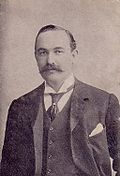| Barnstaple | |
|---|---|
| Former county constituency for the House of Commons | |
Barnstaple in Devon 1885-1918 | |
| 1885–1950 | |
| Seats | one |
| Replaced by | North Devon and Torrington |
| 1295–1885 | |
| Seats | two |
| Type of constituency | County constituency |
Barnstaple was a constituency centred on the town of Barnstaple in Devon, in the South West of England. It returned two Members of Parliament to the House of Commons of England until 1707, House of Commons of Great Britain until 1800 and the House of Commons of the Parliament of the United Kingdom until 1885, thereafter, one.
Contents
- Boundaries
- Members of Parliament
- 1295–1885
- 1885–1950
- Election results
- Elections in the 1830s
- Elections in the 1840s
- Elections in the 1850s
- Elections in the 1860s
- Elections in the 1870s
- Elections in the 1880s
- Elections in the 1890s
- Elections in the 1900s
- Elections in the 1910s
- Elections in the 1920s
- Elections in the 1930s
- Elections in the 1940s
- Notes
- References
It was created in 1295 and abolished for the 1950 general election. Most of the area and the town falls into the North Devon seat.







